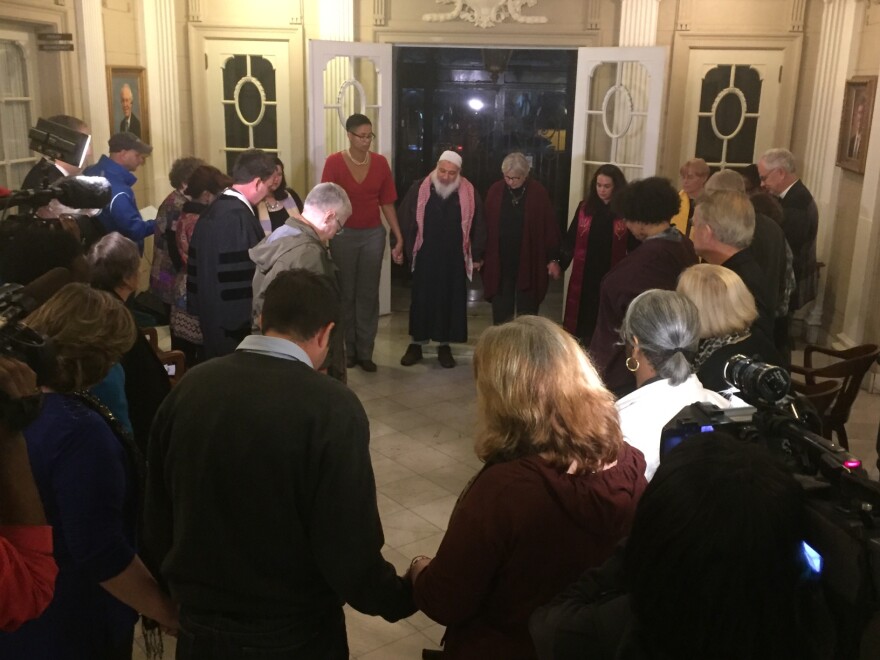On the political map, Tennessee is nearly solid red and religiously conservative. But even in its islands of blue, liberals vote with their spiritual beliefs in tow. Around 63 percent of Shelby County voters consider themselves Christians. And 63 percent of Shelby County voters chose Hillary Clinton over Donald Trump (who earned 35 percent) for President last November. So election night for many Christians (and liberals) wasn’t easy.
Not for Alice Shands, at least.
The Sunday after Trump won, her congregation was asked to pray for the new President.
“And I just went [groan],” she said. Out loud. “I did! And I was ashamed of myself. Even Donald Trump, no matter what I feel, deserves our prayers.”
In the last few months, many left-leaning Christians like Shands have been thinking about an old bumper sticker question: “What Would Jesus Do?”
For her part, she quickly organized an interfaith prayer at Memphis Theological Seminary. That led to a Facebook group called Together We Pray West Tennessee, which meets to pray, but also to generate ideas.
“How do we move forward? How do we put faith in action for this?” she asks.
Some progressive church groups are reaching out in nontraditional ways. One Christian political meet-up last month, aptly called "Civil Pour," was held in a bar. One attendee, William Justice, said that the election made him more conscientious about his Christian identity.
“You always feel like your religion is being represented by people who have conflicting political views to your own,” he says.
Liberal Christians are becoming more politically engaged across the country. In North Carolina, a series of protests called Moral Mondays led to offshoots in Georgia and South Carolina.
Some speculate that the backing of Trump by evangelicals – despite the candidate’s salty vernacular, multiple marriages and past support of Planned Parenthood – raises doubts about the actual motives of “values voters.”
Robert P. Jones, CEO of the Public Religion Research Institute (PRRI) and author of the recent book The End of White Christian America, says the Biblical story of Esau comes to mind.
“The lesson there is that Esau traded away his inheritance for a single pot of stew,” Jones says. “It’s the kind of classic trading away something very valuable for a short-term gain. And I think that lesson is very apt for what happened with evangelicals in this election cycle.”
So what did evangelicals trade away? Jones says: the moral high ground.
Five years ago, PRRI asked different denominations whether politicians who behaved immorally in their private lives could still ethically fulfill their public duties. At the time, only about three in ten evangelicals said yes to that question – one of the least likely groups to do so.
Fast forward to last year, when the same poll was taken just after Trump became the nominee.
“White evangelicals moved from becoming the least likely group to the most likely group,” Jones says. “More than seven in ten evangelicals now say that a politician who is immoral in their private life can nonetheless behave ethically in their public life, so it stood evangelical political ethics on its head.”
Jones says that it’s still too early to tell if liberal Christians could become the new Moral Majority. One setback for them, he says, is that progressives are diverse; they rarely unite around a single cause.
But Jones does see a new bond developing between progressive Christians and a growing number of religiously unaffiliated Americans, particularly around immigration.
“Those two groups together are actually quite a bit bigger than the Christian right groups in the country,” Jones says.
Broderick Greer is a 26-year-old curate at Grace St. Luke’s Episcopal Church and school. Last year, he started a podcast called Theology Live. Topics include religion, culture, justice and the arts. The day after the election, his live audience doubled from 30 to 60 people. Greer says that Christians of all stripes are looking at recent policy changes and asking questions of their church’s doctrine.
“One of those questions is: ‘What is the central message of Jesus?’” Greer says.
Liberals, he says, often take the biographical approach.
“Jesus came, was poor, lived among poor people and proclaimed good news to poor people,” he says.
And that explains why many progressive religious organizations have been well-represented at recent protest marches – from women’s rights to immigration.
“The core of our mission should be among the dispossessed, the displaced, refugees, people who Jesus found himself with,” he says.
For many religious leaders in the Mid-South, particularly those who have more centrist congregations, today’s divisive political landscape poses a ministerial challenge. Vrizola Law, senior minister at Lindenwood Christian Church, said she saw Facebook and Twitter battles erupt between members. Old friendships became strained.
“The tension that I am called to shepherd is this sense of ‘how do I help those who have voice, who felt like their voice has been heard as liberals?’” Law says. “But also how do I give voice and shepherd those who are also conservative and feel like they’ve not been heard in these last eight years? And how do we live in that tension, that paradox?”
Her recent message has been a non-partisan one. Also, a basic Christian tenet: kindness to others.
“And so I’m encouraging us to spend time with the ‘other,’ but do it in such a way that there is healing and there is movement, but still a way that honors your own commitment.”
Law says that as tempting as it may be to take sides, her job is, ultimately, to bring those sides together in Christ.



